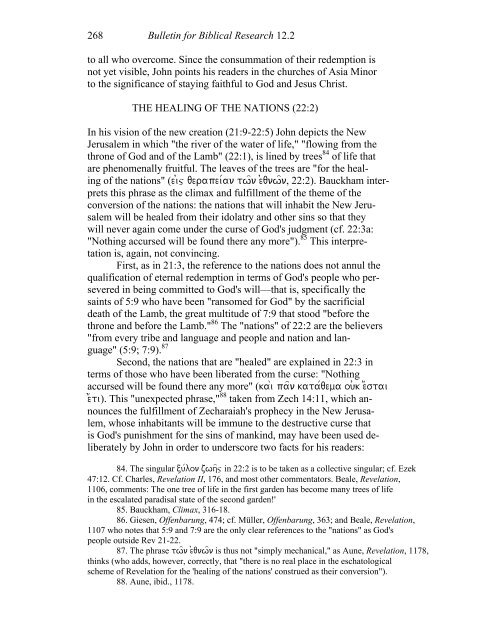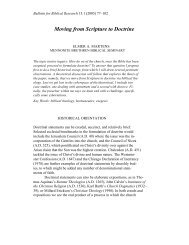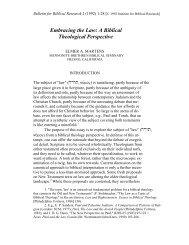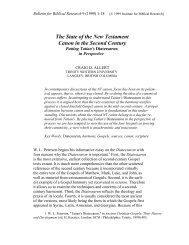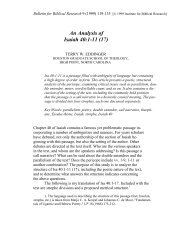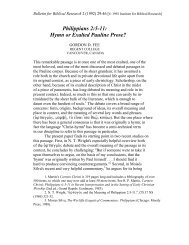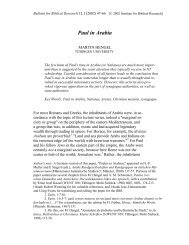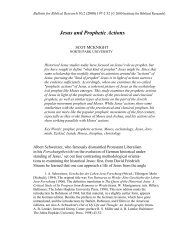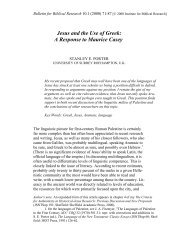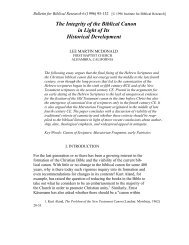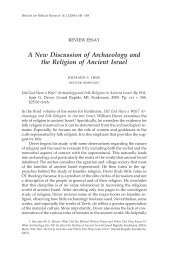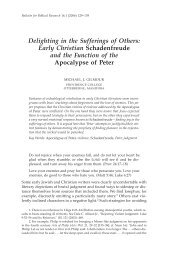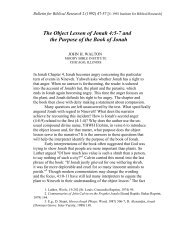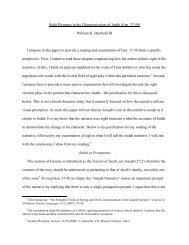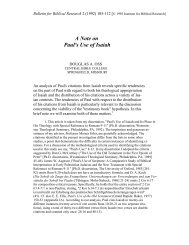John and the Future of the Nations - Institute for Biblical Research
John and the Future of the Nations - Institute for Biblical Research
John and the Future of the Nations - Institute for Biblical Research
You also want an ePaper? Increase the reach of your titles
YUMPU automatically turns print PDFs into web optimized ePapers that Google loves.
268 Bulletin <strong>for</strong> <strong>Biblical</strong> <strong>Research</strong> 12.2<br />
to all who overcome. Since <strong>the</strong> consummation <strong>of</strong> <strong>the</strong>ir redemption is<br />
not yet visible, <strong>John</strong> points his readers in <strong>the</strong> churches <strong>of</strong> Asia Minor<br />
to <strong>the</strong> significance <strong>of</strong> staying faithful to God <strong>and</strong> Jesus Christ.<br />
THE HEALING OF THE NATIONS (22:2)<br />
In his vision <strong>of</strong> <strong>the</strong> new creation (21:9-22:5) <strong>John</strong> depicts <strong>the</strong> New<br />
Jerusalem in which "<strong>the</strong> river <strong>of</strong> <strong>the</strong> water <strong>of</strong> life," "flowing from <strong>the</strong><br />
throne <strong>of</strong> God <strong>and</strong> <strong>of</strong> <strong>the</strong> Lamb" (22:1), is lined by trees 84 <strong>of</strong> life that<br />
are phenomenally fruitful. The leaves <strong>of</strong> <strong>the</strong> trees are "<strong>for</strong> <strong>the</strong> healing<br />
<strong>of</strong> <strong>the</strong> nations" (ei)j qerapei/an tw=n e)qnw=n, 22:2). Bauckham interprets<br />
this phrase as <strong>the</strong> climax <strong>and</strong> fulfillment <strong>of</strong> <strong>the</strong> <strong>the</strong>me <strong>of</strong> <strong>the</strong><br />
conversion <strong>of</strong> <strong>the</strong> nations: <strong>the</strong> nations that will inhabit <strong>the</strong> New Jerusalem<br />
will be healed from <strong>the</strong>ir idolatry <strong>and</strong> o<strong>the</strong>r sins so that <strong>the</strong>y<br />
will never again come under <strong>the</strong> curse <strong>of</strong> God's judgment (cf. 22:3a:<br />
"Nothing accursed will be found <strong>the</strong>re any more"). 85 This interpretation<br />
is, again, not convincing.<br />
First, as in 21:3, <strong>the</strong> reference to <strong>the</strong> nations does not annul <strong>the</strong><br />
qualification <strong>of</strong> eternal redemption in terms <strong>of</strong> God's people who persevered<br />
in being committed to God's will—that is, specifically <strong>the</strong><br />
saints <strong>of</strong> 5:9 who have been "ransomed <strong>for</strong> God" by <strong>the</strong> sacrificial<br />
death <strong>of</strong> <strong>the</strong> Lamb, <strong>the</strong> great multitude <strong>of</strong> 7:9 that stood "be<strong>for</strong>e <strong>the</strong><br />
throne <strong>and</strong> be<strong>for</strong>e <strong>the</strong> Lamb." 86 The "nations" <strong>of</strong> 22:2 are <strong>the</strong> believers<br />
"from every tribe <strong>and</strong> language <strong>and</strong> people <strong>and</strong> nation <strong>and</strong> language"<br />
(5:9; 7:9). 87<br />
Second, <strong>the</strong> nations that are "healed" are explained in 22:3 in<br />
terms <strong>of</strong> those who have been liberated from <strong>the</strong> curse: "Nothing<br />
accursed will be found <strong>the</strong>re any more" (kai_ pa=n kata/qema ou)k e!stai<br />
e!ti). This "unexpected phrase," 88 taken from Zech 14:11, which announces<br />
<strong>the</strong> fulfillment <strong>of</strong> Zecharaiah's prophecy in <strong>the</strong> New Jerusalem,<br />
whose inhabitants will be immune to <strong>the</strong> destructive curse that<br />
is God's punishment <strong>for</strong> <strong>the</strong> sins <strong>of</strong> mankind, may have been used deliberately<br />
by <strong>John</strong> in order to underscore two facts <strong>for</strong> his readers:<br />
84. The singular cu/lon zwh=j in 22:2 is to be taken as a collective singular; cf. Ezek<br />
47:12. Cf. Charles, Revelation II, 176, <strong>and</strong> most o<strong>the</strong>r commentators. Beale, Revelation,<br />
1106, comments: The one tree <strong>of</strong> life in <strong>the</strong> first garden has become many trees <strong>of</strong> life<br />
in <strong>the</strong> escalated paradisal state <strong>of</strong> <strong>the</strong> second garden!'<br />
85. Bauckham, Climax, 316-18.<br />
86. Giesen, Offenbarung, 474; cf. Müller, Offenbarung, 363; <strong>and</strong> Beale, Revelation,<br />
1107 who notes that 5:9 <strong>and</strong> 7:9 are <strong>the</strong> only clear references to <strong>the</strong> "nations" as God's<br />
people outside Rev 21-22.<br />
87. The phrase tw=n e)qnw=n is thus not "simply mechanical," as Aune, Revelation, 1178,<br />
thinks (who adds, however, correctly, that "<strong>the</strong>re is no real place in <strong>the</strong> eschatological<br />
scheme <strong>of</strong> Revelation <strong>for</strong> <strong>the</strong> 'healing <strong>of</strong> <strong>the</strong> nations' construed as <strong>the</strong>ir conversion").<br />
88. Aune, ibid., 1178.


